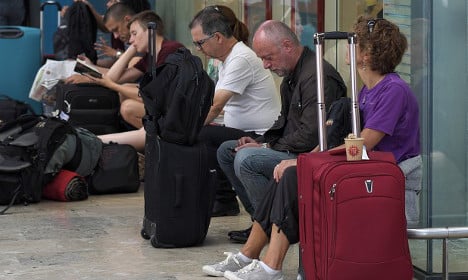Main info:
- TGV services across France severely reduced
- RER services around Paris are running at around one third of usual service
- Paris Metro should be running almost as normal
- Getting to Charles de Gaulle airport requires change at Gare du Nord
- Some services cancelled on the Eurostar
Rail passengers were facing travel chaos in France on Wednesday as one of the biggest strikes in years hit services across the country.
Main trains were cancelled and in most of the country between 30 percent and 50 percent of normal services were running.
Passengers faced long delays to catch their trains and commuters faced having to make several changes to get to work in Paris. Rail chiefs are advising people to delay any non-urgent travel.
It is the first time the four unions – normally divided over the questions around rail reform – have joined forces for a protest since June 2013, when only four out of every ten trains were running.
It's also the first time since 2013 that SNCF and Paris transport workers from RATP have gone on strike together.
Unions are demanding the recruitment of more staff, a rise in salaries and guarantees about improvements in work conditions.
Grève du 09/03: info trafic, modalités échange/remboursement sur https://t.co/tupYrBAX9M ou https://t.co/e2VaaSqWLt pic.twitter.com/wohmFHCt6C
— SNCF (@SNCF) March 8, 2016
The strike, which comes on the same day as nationwide protests against labour reforms, comes just days before the annual negotiations between unions and bosses on March 11th. The industrial action has been described as a warning shot.
The strike, which began on Tuesday evening, will run until Thursday 8am.
SERVICES AFFECTED:
One of the worst hit areas is the Ile-de-France area around Paris, where only one third of trains will be running.
RER commuter services around the Ile-de-France region are severely disrupted and as a result many workers have opted to take their cars. Around 255km of traffic jams were recorded in the Paris region on Wednesday morning – more than double the usual amount.
In particular passengers should note that on the RER B, which links the centre of Paris to the city’s two airports Charles de Gaulle and Orly, only 50 percent of the normal services will be running.
SNCF staff were out in force at stations to advise travellers on their best option.
Paris, Gare du Nord. Les “gilets rouges” de la SNCF, table des horaires en main, renseignent les voyageurs. #greve pic.twitter.com/nth3ErVyKS
— Olivier Razemon (@OlivierRazemon) March 9, 2016
Anyone hoping to get to Charles de Gaulle airport in the north of the city will have to change at Gare du Nord.
Although staff from RATP, which runs the Paris Metro system, have joined the walk-out, services on the city’s underground network are expected to run almost as normal.
Trafic normal sur l'ensemble des lignes de Métro. #RATP
— Ligne 1 RATP (@Ligne1_RATP) March 9, 2016
The Eurostar services between Paris and London are also affected by the strike with 20 percent of trains expected to be cancelled.
Some trains will be cancelled on 9th March due to a strike in France. For more details please see https://t.co/GOrDgYbODR
— Eurostar (@Eurostar) March 4, 2016
As for TGV services, only one in three of the usual services are operating out of Paris to the north of the country and the Atlantic coast. And it will be the same for TGV services linking cities in the south east of the country.
In the East of the country, only 50 percent of TGV services are running meaning passengers face long waits to get a train.
According to France Bleu radio, around 80 percent of trains have been cancelled ion the Auvergne-Rhône Alps area.
“1045 trains sur 1200 supprimés” ce mercredi en #AuvergneRhoneAlpes selon la CGT Cheminots de #StEtienne #SNCF pic.twitter.com/Ok6qEp95Ds
— FBleu StÉtienneLoire (@bleustetienne) March 9, 2016
On the TGV low cost service Ouigo, 60 percent of services have been cancelled and only 30 percent of the regional Intercité services are running and none at all will operate at night.
International train services to Italy and Spain are also affected.
To find out if your train has been cancelled by the strike, you can CLICK HERE.
Have you been affected by the strike? Tweet us @TheLocalFrance or on Facebook by clicking link below.



 Please whitelist us to continue reading.
Please whitelist us to continue reading.
Member comments